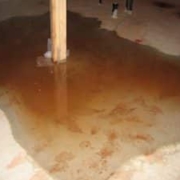4 Tips for Basement Rust Prevention
Basement Rust
If you are finishing your basement, there are several issues you have to deal with. The most prominent of these is of course basement water and moisture. The location of the basement below the ground level makes it susceptible to water leakage. Such water can either emanate from the soil surrounding the foundation wall or even seep through the floor from the ground.
Whatever the source of basement water, there are a lot of risks that can be avoided through efficient waterproofing. One of the major problems caused by moisture presence in this space is basement rust.
When remodeling this space, you need to look out for the unsightly orange brown crust that occurs on metal surfaces. Open air oxidization of iron surfaces leads to rust, which in chemical form is presented as Fe2O3.nH2O. This chemical composition might not mean much to a homeowner but the impact will be felt with time.
The Perils of Basement Rust
Your basement hosts metal piping for utilities and if they are affected, this can lead to costly repairs in future. Worse still, rust can also compromise the integrity of your fasteners if it corrodes fasteners holding wood joists. A weak foundation can ruin your precious investment in case of a heavy storm. Rust also diminishes the value of the property because a home buyer will be looking for any warning signs of water damage.
Ideas to Deal with Rust in the Basement
To prevent basement rust, you need to comprehensively deal with moisture problems in this space. When oxygen and water react, the corrosive effect on iron metal materials is inevitable. Below is a simple guide to help deal with this problem comprehensively:
- Identify the water source: The water could be seeping in through wall cracks or the floor. It could also be as a result of window well overflow. It is important to hire a contractor who will carry out diagnostic tests to identify the source of water.
- Waterproofing ideas: Once the problem has been identified, an appropriate waterproofing technique should be deployed. This can either be exterior or interior waterproofing, French tile installation or sump pump installation. The idea is to ensure no vapor or water enters the basement space.
- Piping insulation: Utility pipes and tanks can be insulated to avoid condensation. There are different materials used for this purpose and this also ensures longer life of these fixtures.
- Dehumidification: A basement dehumidifier keeps the space dry and prevents condensation on metal surfaces, which eventually leads to corrosion.
Preventing basement rust should be top of your home improvement projects. Call in a qualified contractor for effective and professional rust prevention and removal solutions.
